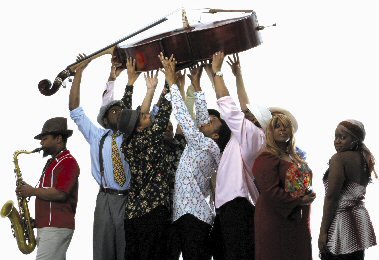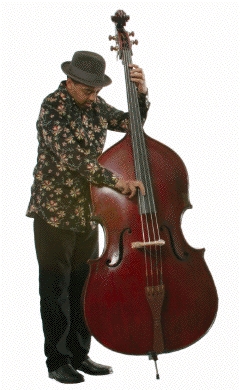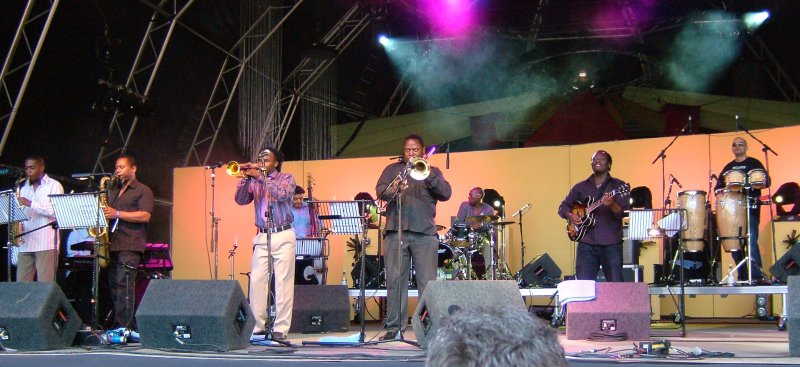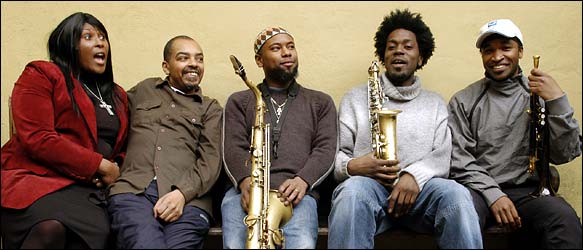JAZZ JAMAICA / “War”
There's this phrase that's bandied around in the States: European jazz. Everyone talks about it like it's a unified idiom. I don't know if we want to be included in that.
—Soweto Kinch
We're black Europeans, and we're not really part of the Eurocentric jazz music. The meaning of European jazz, it can only come from us. We're the only community in Europe that, racially, has no restrictions. It can only be us.
—Gary Crosby

This is a jazz record that American musicians would have had a hard time making. The rhythms are Jamaican. The repertoire is Motown. American jazz musicians are not adept at playing within the pop box—most attempts sound horrible. But these black British folk grab a hold to this material and don’t let go. They don’t slip, they don’t quit. It’s exhilarating.
Founded in 1991 by bassist Gary Crosby, Jazz Jamaica has established itself as one of the most significant European-based jazz bands. Born in West London of Jamaican parents on January 26, 1955 Gary Crosby is a visionary and arts activist. In addition to Jazz Jamaica (nine pieces plus guest vocalists), Crosby also leads Jazz Jamaica Allstars (upwards of twenty pieces plus vocalists) and Nu Troop (a straight ahead jazz combo). He’s a busy man.
Gary Crosby was a founding member of the legendary Jazz Warriors and never lost his love of jazz, but he is also Afro-Caribbean and has a deep love of his Jamaican roots which include an indelible taste for the one drop. Instead of an emphasis on swing, this aggregation loves to skank.
Motorcity Roots (2006) is the sixth album from Jazz Jamaica. Two of their albums are near impossible to find as they were limited edition Japanese productions. “Skaravan” (a combination of “ska” rhythms with the jazz standard “Caravan”) is the title cut from their debut release, Skaravan (1993). “Take Five” is from The Jamaican Beat, one of their Japanese releases. Although both ably demonstrate their jazz chops and are undeniably a joy, neither is as important as Motorcity Roots.
What I like most about Motorcity Roots are the arrangements and the jazz elements that lift the session way beyond just a great tribute album. Although the vocals are prominent in the mix, it’s the way the deft instrumental elements are employed that really makes this music shine—from innovative voicings of the melodies to pithy albeit substantial horn solos, these are true jazz interpretations.
Imagine if Duke Ellington and Billy Strayhorn had wrapped their arranging genius around a dozen Motown hits plus rolled the arrangements over a heavy one-drop rhythm section.
Trumpeter Abram Wilson is featured on The Jackson 5 staple “I Want You Back.” Although he’s mixed down in the mix, guitarist Robin Banerjee is one of the keys to the cool runnings of this version. These guys play with the precision and verve of a traditional New Orleans jazz band. Especially after the opening chorus, they toss around instrumental fills, the melody bobbing and weaving from horn to horn over keyboard jabs and an ever dancing percussion shuffle.
“Tears Of A Clown” featuring vocalist Juliet Roberts ups the ante as Juliet both duets and duels with instrumental riffs from her bandmates. It’s five minutes of mirth with the emphasis on clowning, i.e. having a good time—obviously the emphasis here is on the public happiness of a song that actually focuses on private sadness.
Stevie Wonder’s “I Was Made To Love her” features vocalist Wesley Lucas capably undertaking the difficult task of singing a signature Stevie song. Once again the band is on the case and keeps the groove jumping. Denys Baptiste solos like he’s been waiting all of his lie to drop this serpentine soprano sax sortie.

From left: Juliet Roberts, Gary Crosby, Denys Baptiste, Soweto Kinch and Abram Wilson – photo by Sarkis Boyadjian.
The piece de resistance is “War,” which sounds nothing like the original. Indeed the opening had me confounded. I couldn’t hear how they were going to fix the familiar melody atop the chaos theory of the rhythm section. Once they got into it, I said, OK, I see what they’re doing except when they got to the bridge they changed up again and after that they did a rhythm breakdown and set Harry Brown’s trombone against Denys Baptist’s saxophone, and finally pushed the percussion forward. It’s brilliant.
Jazz Jamaica is the international blossoming of jazz. Notice that just like Coltrane went back to soprano master Sidney Bechet and country blues both for inspiration as well as to mine fuel for his forward flights, this intrepid band of iconoclasts are basing their ground breaking music on exploration of the Caribbean and American roots of their emerging Afropean identity. We can never become our full potential unless we dig the deepness of our historic roots—to become all we can be, we must embrace who we’ve been: it’s the beauty of rebirth manifested time and time again.
This embrace of our "blackness" (to use a convenient shorthand), if the embrace is to be truly meaningful, must be an embrace of the diversity of blackness and not just the espousal of a particular blackness we ascribe to or identify with because of the circumstance of birth, upbringing or national origin. After all, even on the continent—I should say "especially" in Africa—what it means to be of black heritage is very, very different when measured say between Cairo, Egypt and Capetown, South Africa, or between Dar es Salaam, Tanzania and Dakar, Senegal. Once you add in the diaspora, whether in the Western Hemisphere or throughout Europe, whether in the Caribbean isles or the Pacific isles, once you factor the diaspora into the equation of blackness, what results is a complex fabric that has both commonalities and divergencies.
It is very, very difficult to talk about blackness as a concept or a factual whole and at the same time deal with the wide divergencies among peoples who are considered black—regardless of whether it's our people doing the considering or whether it's others looking at and evaluating blackness. It's just incredibly difficult and this is precisely why our alleigance to black music is so important. The music is as broad as black life. The music welcomes all to its beating breast regardless of who you are or where you come from.
Some do not understand how (or really they do not understand "why") we include non-black artist who work in the idiom of black music. It is an easy arrogance to segregate ourselves from others and it is wrong. If we start drawing lines of separation, where do we stop? Do we say that Jazz Jamaica shouldn't be playing Motown because they are British citizens, or worse, rather than argue that they shouldn't, wouldn't it be backwards of us to argue that they can't authentically play Motown music?
What is significant is that rather than merely try to imitate us, Jazz Jamaica learns from us and brings what they have learned to their own pots. They use their own recipes to create new dishes to feed our musical hungers. We all have our own contradictions and differences within and between each other. In a certain sense, whether a reggae one-drop or an R&B backbeat, whether a Toumani Diabate kora solo or a John Coltrane saxophone solo, the important thing is not some misguided effort to show that because it's all black music it is therefore all the same. No. The important thing is to recognize that yes it is all black music and yes there are major differences. Black diversity is black beauty and black beauty is diverse. And ditto for the music.
Thank you Jazz Jamaica. By being true to your own roots, you extend and deepen the reach and significance of black music.
—Kalamu ya Salaam
What a cover is supposed to do
When I heard what these dudes did with the instrumental part of their version of "Just My Imagination," I knew I was going to like them. Their version of "Take Five" is a trip! It's a classic jazz tune that they've played in such a different way, it sounds like it was meant to be a reggae instrumental in the first place. That's what a cover is supposed to be and do. Nice.
On some of the other tunes, the vocals really mar what they're doing instrumentally. As Kalamu said, "It’s the way the deft instrumental elements are employed that really makes this music shine." To which I say, "Amen." And, I wish this band would stick to their strength and just play. Leave the singing to pop groups. These cats are instrumentalists and damned good ones.
—Mtume ya SalaamThis entry was posted on Monday, April 14th, 2008 at 1:48 am and is filed under Contemporary. You can follow any responses to this entry through the RSS 2.0 feed. You can leave a response, or trackback from your own site.
One Response to “JAZZ JAMAICA / “War””
April 14th, 2008 at 5:06 pm
I like this very much. I have been playing it all day. Thanks ever so much for turning me onto Afropean jazz — Rudy
Leave a Reply
| top |